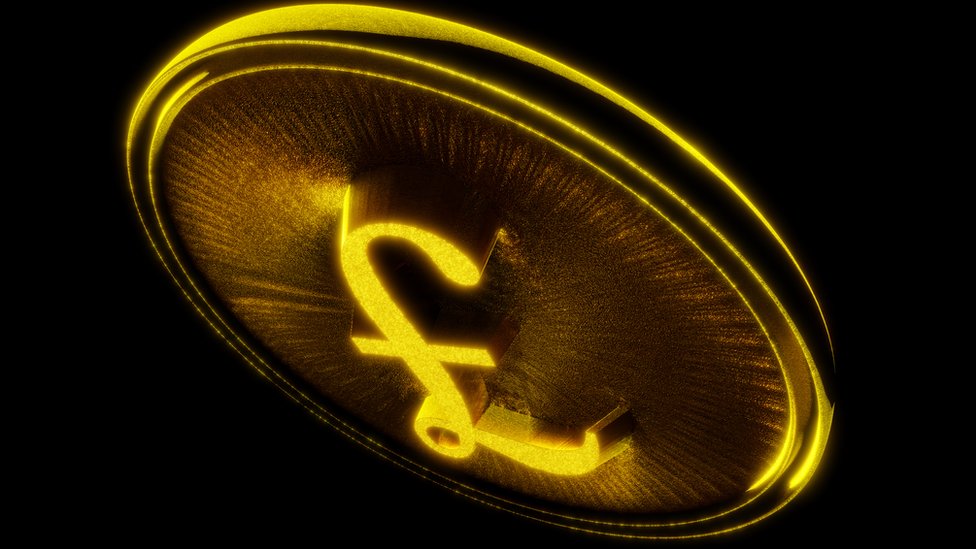[ad_1]
“Treasury Says UK Could See Digital Pound in the Next Decade”
Graphic with a pound sign in the middle
A government-backed digital pound is expected to be launched later this decade, according to the Treasury and the Bank of England.
Both institutions aim to ensure the public has access to safe money that is easy to use in the digital age.
Chancellor Jeremy Hunt said the central bank digital currency (CBDC) could be a new “trusted and accessible” payment method.
But it won’t be built until 2025 at the earliest.
“We want to explore what’s possible first, while always making sure we protect financial stability,” Hunt said.
The Treasury and the Bank of England will formally launch a digital currency consultation on Tuesday.
Cryptocurrencies are not backed by a central bank and values can rise and fall quickly.
But while it may use similar technologies to cryptocurrencies like Bitcoin and Ethereum, the digital pound issued by the Bank of England would be less volatile. Ten digital pounds is always worth £10 in cash, Treasury says.
However, as holidaymakers know, the value of the pound changes compared to other currencies.
Prime Minister Rishi Sunak has urged the Bank of England to look into supporting a currency in 2021 as Chancellor.
And in October 2022, Mr Sunak’s Financial Services Secretary, Andrew Griffith, warned that a longer delay could create problems for the economy.
Monetary science fiction?
Analysis box by Faisal Islam, Business Editor
There is hardly any need for a digital pound at the moment. People use their debit cards or phones or even watches to perform the same function. It’s a solution to a problem that doesn’t exist yet.
But that’s a near-future look that sounds like monetary science fiction. At its core, it’s about data on what you’re spending and what the general population is spending. It’s a world where people may choose to trust international private sector brands more than the state in finance or technology. Think Amazon or Facebook, or maybe Chinese-owned Alibaba or Tiktok, which have a version of the sterling.
Companies that control the data on everything someone spends, when and where they spend it will be sitting on a priceless asset. Unregulated digital currencies could incentivize these companies to create walled gardens and fragment the sterling system. It would make controlling the economy harder as £1 might not be worth £1 everywhere.
This is where today’s ideas come into play. Neither the Bank of England nor the government would have access to the data on digital pound transactions. But consumers could choose providers, not just banks, to store their money in digital wallets with varying levels of privacy. Some users may be okay with their wallet provider knowing all of their transactions if, for example, they received a discount. Others may wish to remain as private as possible. The Ministry of Finance wants to promote innovation.
Other, larger blocs like the US and the Eurozone also want their digital dollars and digital euros to be international mediums of exchange. That’s less of an obvious goal here. The focus here is on maintaining the UK’s monetary sovereignty against upheavals like Big Tech.
exit restrictions
If given the green light, there would then be significant investment to launch the currency.
There will likely be initial limits on how much of the currency an individual or entity can hold.
Bank of England Governor Andrew Bailey said the digital pound would offer a new way to make payments, “help businesses maintain confidence in money and better protect financial stability”.
He stressed the importance of the consultation being the “basis” for a “deep” decision on the future use of money.
What could a digital pound look like?
-
It would replicate the role of cash in a digital world
-
Issued by the Bank of England
-
Subject to strict privacy and data protection standards
-
Access via digital wallets via smartphones or smart cards
-
Intended for payments online, in business and to friends and family
-
Initial limits on how much a person or company can hold
Countries around the world, including the US, China and the eurozone, are considering similar proposals.
[ad_2]
Don’t miss interesting posts on Famousbio
